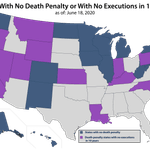
Utah has become the latest U.S. state to have gone more than a decade without carrying out an execution. The state last put a prisoner to death on June 18, 2010, when it executed Ronnie Gardner by firing squad.
Utah joins a list of 34 states — more than two thirds of the country — that either do not have the death penalty or have not carried out an execution in at least a decade. Twenty-two states no longer authorize capital punishment. Twelve of the 28 states (42.9%) that do have the death penalty have not executed anyone in at least 10 years. It has been even longer — 12 years — since Utah last imposed a new death sentence.
The decline of the death penalty in Utah is part of a sweeping trend away from the death penalty in the western United States. In the last two years, Washington and Colorado have abolished the death penalty, California has imposed a moratorium on executions and dismantled its execution chamber, New Mexico has cleared its death row, and Oregon and Arizona have both narrowed the circumstances in which the death penalty may be imposed. 2019 marked the fifth consecutive year with no executions west of Texas. The four new death sentences imposed in 2019 were the fewest in the West since California reinstated its death penalty in 1977, and fell by half from the prior record low set in 2018. Only three counties west of Texas sentenced anyone to death in 2019. With this anniversary, only two of the eleven states west of Texas — Arizona and Idaho — still have a death penalty and have carried out an execution within the last decade.

Since 2016, Utah has seen two abolition efforts led by Republican legislators. State Senator Steve Urquhart, a former death-penalty supporter, sponsored an abolition bill in 2016. “I ask my conservative friends what they think government does extremely well. And then I ask them what they think government does perfectly. And they usually say, ‘It doesn’t do anything perfectly.’ And then I ask, ‘Yet we’re going to give ourselves the godlike power over life and death?’” He also said that, increasingly, he has moral qualms about capital punishment: “I’m thinking that it’s wrong for government to be in business in killing its own citizens. That cheapens life.”
Urquhart’s bill passed the Utah Senate and a House committee but did not receive a vote in the full House. In 2018, Representative Gage Froerer sponsored another repeal bill, but ultimately withdrew it because he believed it would fail on a close vote in the House. “I was hopeful that Utah would be one of the first red states to take this, because the trend obviously is to do away with the death penalty,” Froerer said. “I’m convinced whether it’s next year or five or 10 years from now the death penalty will go away.”
The last execution in Utah, that of Ronnie Gardner on June 18, 2010, was surrounded by controversy. Family members of the victim, Michael Burdell, supported clemency for Gardner and asked that the execution be halted. “Knowing Michael, as I did, he would not want Ronnie Lee to be executed,” Burdell’s former girlfriend, Donna Nu, said at a court hearing. “Further, he would not want to be the reason Ronnie Lee is executed.” Religious leaders from a variety of faiths decried Gardner’s execution.
Utah’s method of execution also attracted widespread attention, as Gardner became the first person in 14 years to be executed by firing squad. Though the state had abandoned the firing squad as an execution option in 2004, Gardner was still eligible to select it because he had been sentenced to death before the law was amended. In 2015, Utah re-instituted the firing squad as a back-up method of execution in the event that lethal injection was declared unconstitutional or became unavailable.
Utah is the only state to have carried out executions by firing squad since the reinstatement of the death penalty in the 1970s. Gardner is the last person to have been executed by that method. The state has employed sharpshooters to execute two other prisoners: Gary Gilmore in 1977, who was the first person executed in the U.S. after Gregg v. Georgia allowed executions to resume, and John Taylor in 1996.
Posted by DPIC, June 18, 2020.
Recent Legislative Activity
Feb 02, 2024

Ohio Officials Divided on Death Penalty as Attorney General Pushes New Bill to Legalize Nitrogen Hypoxia for Executions
Recent Legislative Activity
Dec 13, 2023

After Five-Year Execution Pause, Ohio Leaders Question Value of Death Penalty
Recent Legislative Activity
Nov 17, 2023
